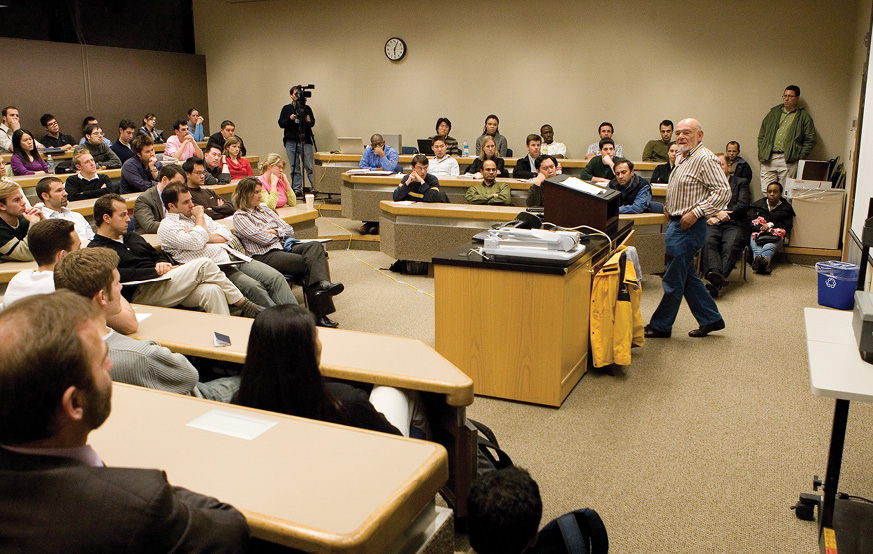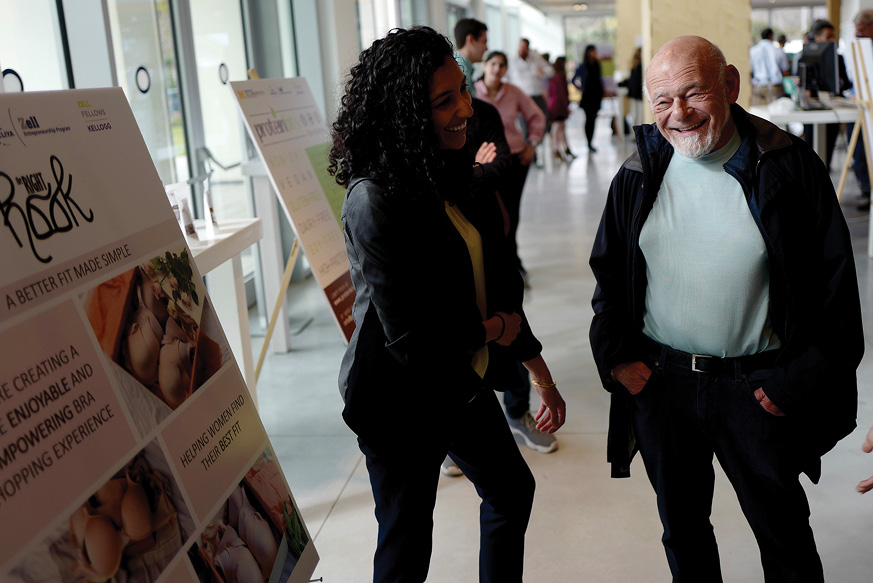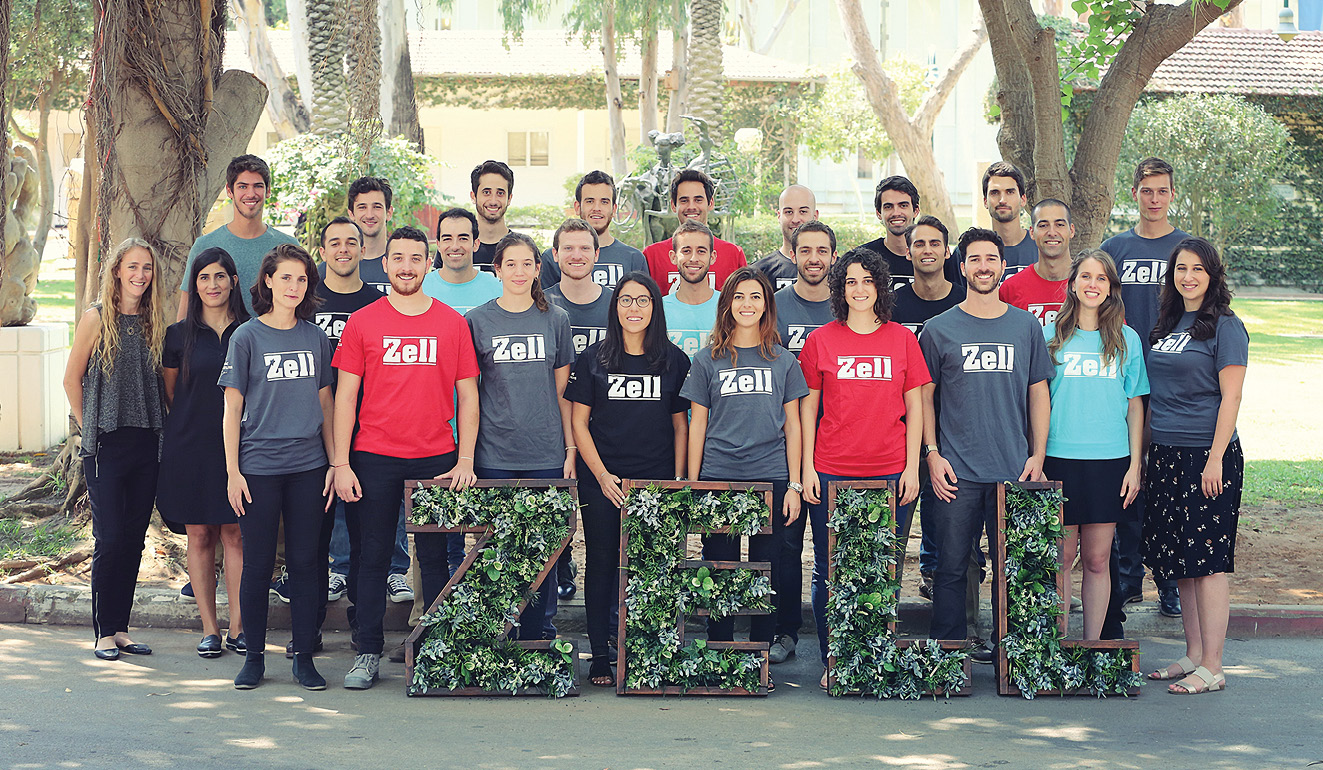- Home
- Media Kit
- Current Issue
- Past Issues
- Ad Specs-Submission
- Ad Print Settings
- Reprints (PDF)
- Photo Specifications (PDF)
- Contact Us


![]()
ONLINE

Passion and Purpose
Editors’ Note
Sam Zell is a global, opportunistic and often contrarian investor. He specializes in identifying market anomalies and emerging trends and has a long track record in turning around troubled companies and assets, leading industry consolidations, and bringing companies to the public markets. Much of his investment portfolio is in energy, logistics, transportation, manufacturing, communications and healthcare, but he is often best known for his pioneering role and stewardship in creating the modern commercial real estate industry. Zell is the Founder and Chairman of Equity Group Investments, a private investment firm. He chairs five companies listed on the NYSE and also chairs Equity International, a private equity firm he founded to focus on real estate-related opportunities outside of the U.S. Zell is recognized for his advocacy of corporate governance, particularly in real estate and in the emerging markets. He is an active philanthropist with a focus on entrepreneurial education. Zell holds a J.D. and a B.A. from the University of Michigan. He began his career in real estate while still an undergraduate. Zell’s book on how he became a self-made billionaire is called, Am I Being Too Subtle?
Company Brief
Equity Group Investments (egizell.com) is a private investment company. Its founder, Sam Zell, pioneered the public equitization of the commercial real estate industry through the creation and leadership of Equity Residential, Equity LifeStyle Properties, and Equity Office Properties Trust. EGI’s investment portfolio encompasses a broad range of corporate and real estate interests, a small sampling of which includes Anixter International, Covanta Holding Corporation, Ardent Health Services, Exterran Corporation, RailUSA and Par Pacific.

Sam Zell teaching a class at the Zell Lurie Institute
at the University of Michigan Ross School of Business
What are the keys to effective philanthropy?
I remember doing my taxes one year in the 1980s. I had given $1,000 to a hundred different organizations and realized I felt none of it was making any real impact. That ran counter to everything else I did in my life.
My career has been all about making an impact – changing something for the better – and it has worked because I am personally involved. I set a vision, give guidance on strategy, establish accountability, manage risks and so on.
It dawned on me that day – if I wanted to really make a difference in my philanthropy, I had to apply the same approach. I had to combine my own passion with a focus. In other words, I had to invest both financial capital and personal capital.
I went from giving $1,000 to everybody and having nothing to do with any of them to narrowing my contributions down to a few areas I felt very strongly about. I wanted part of their success to be based on my involvement. I wanted to stand behind and lend strength to program leadership executing the day-to-day work.
Will you elaborate on the power of passion?
I get asked all the time about why so many of the people I hire stay around for so long. We have an inordinate number of people – at all levels – who have grown up within our Equity-related companies and have been here for decades. I respond by talking about passion, and the fact that we need passion at least as much as we need intellectual quotient, maybe more.
Passionate people tend to be self-starters. They are invested in the outcome, and they tend to have a sense of urgency to get there. My role is to give them the opportunities to stretch and to guide and support them. Together, that’s a powerful combination.
What are your philanthropic focus areas?
Education, entrepreneurship, Jewish day schools and medical centers are our main focus.
We created The Helen Zell Writers’ Program, which encourages creative writing and has been phenomenally successful. The alumni have gone on to win all kinds of awards. What’s fascinating about this arena is that a lot of money is donated to high-tech and business education, but there is very little given to literature, science and the arts. The idea that we’re allocating significant capital to develop and grow the best creative writing program in the country in partnership with the University of Michigan is rewarding.
We’re also proud of all the work we have done in entrepreneurship. If I’m successful in my mission, I will have weaponized a whole cadre of future business leaders. In Israel, with the Zell Entrepreneurship Program, we have 400 alumni who have collectively monetized their start-ups for almost $1 billion, which is really incredible. We have also created a broader community, combining the students and alumni of our other entrepreneurship programs at University of Michigan and Northwestern, and now they all mentor each other, support each other and invest with each other.
Like everything else, sustainable success ultimately revolves around who else climbs onboard, because I’m just one person and, although I have a big checkbook, checkbooks aren’t enough. We need an idea that is strong enough to attract the right kind of people who can perpetuate what we’ve started.
Will you touch on your focus on Jewish day schools?
I’m all for education, and in an unexpected way, Jewish day school education has a big impact on urban development. Part of the reason that I encouraged my family to endow the Jewish day school in the middle of the north side of Chicago was because I knew that its existence would have a significant impact on building and keeping a robust Jewish community in the city.
My encouragement was without any sensitivity to whether the school’s doctrine was conservative, reform or orthodox. I was promoting culture, not religion.
Now we have done the same thing with a high school in the suburbs. I am a big believer because I’m worried about assimilation and about the future of the Jewish community, and I’m looking for ways to perpetuate it.
I had a conversation with someone recently who wanted me to contribute to the creation of a museum in Jerusalem. I told him that the last time I checked, there was no shortage of museums in Jerusalem. However, there is a shortage of people committed to Israel.
Allocating my capital to increasing the American-Jewish connection is important to me. I’m also concerned about divestment and the fact that we have a Jewish community in the United States that takes great pride in separating from Israel. I don’t think that is a good idea.

Sam Zell with a Kellogg student at a Zell Fellows start-up showcase
What about the medical arena?
In the medical arena, we have primarily focused on things that have affected our family. Hopefully, if we solve a disease that one of our children has, it will benefit millions of other people with that disease. Knowing that I may be laying down a marker to help cure a problem that one of my grandchildren has is pretty heady stuff.
I have prioritized my philanthropy to focus on areas in which I have a personal connection and, therefore, a passion. At the same time, I want my contributions to solve the problem we’ve identified while also benefiting mankind.
On the business side, you are known as being results-oriented and metric-driven. In philanthropy, is it harder to track impact?
Of course, and many donors don’t demand metrics or hold the recipients accountable. My methodology of approaching this has been to stick my toe in the water, get a better understanding of the organization, it’s people and it’s potential.
I started the Israeli entrepreneurial program by underwriting a very small part of it for the first five years. It was only after I saw how they seized the opportunity and implemented the program that I increased my involvement. Then, 10 years in, I endowed it because I was confident about what they were doing and the direction they were headed.
We did the same thing with the writer’s program in Michigan. At first, we just endowed a chair. Then we watched how the university and the program interfaced with that. We then began to support a few students, and then a few more and, eventually, we made a major gift to underwrite the program – but only after there was unquestionable passion shown on their side.
There have been circumstances where it hasn’t worked, and I have stopped supporting a program. There was one case where I made a $10 million commitment of $1 million a year for 10 years, but I didn’t feel like I was connected to it, and the program just stalled. It was a difficult decision to terminate that program but, interestingly enough, I ended up supporting something else at the same institution.
Many people assume that job growth comes from Fortune 500 companies, but most of it is driven by small business and start-ups. Is the impact of entrepreneurial companies well understood?
I first got involved in an entrepreneurship program in 1979. What stimulated me was the fact that I had read through the curriculum for the University of Michigan business school and the word “entrepreneur” didn’t seem to exist. I couldn’t understand how that could possibly be the case. Then I discovered that this wasn’t the only MBA program that didn’t recognize entrepreneurship. They all thought it was junk science.
Fast forward to today and the answer is very different. I think the contributions of entrepreneurs to the economy, job growth and innovation is much better understood and appreciated.
Entrepreneurs are and continue to be a basic tenet of what this country is all about.

Students at the Zell IDC (Interdisciplinary Center Herzliya)
in Israel who participate in a one-year program for
those who aspire to work in an entrepreneurial organization
or start their own business
You have a global perspective and run global businesses. Is the U.S. still the leader in innovation and entrepreneurship?
It is very important to define what America’s edge actually is. Our edge is freedom – the freedom to pursue opportunity, to go left when everyone else is going right and to not be ostracized because of it – to fail, get up and chase opportunity all over again.
When immigrants come here, the thing they’re most overwhelmed by is the opportunity – not that anyone is going to give them anything. They love that they can stake out a direction, pursue it and succeed. And if they fail, that is acceptable within our society, and they can start again. We’re the only country in the world that has Chapter 11. In England, if you go broke, you’re liquidated; same in Canada.
My father talked about the fact that the streets in this country were paved with gold. What he was saying was that, as opposed to other parts of the world, there is unlimited opportunity here.
Unlimited opportunity coupled with the rule of law will keep the U.S. in a leadership position. China is doing incredibly well, but in China there are limits to what one can do. I think, in many cases, they are seeing the impact of these limits now. Think about the thought process behind the one-child policy. Effectively, it wasn’t open to a lot of conversation. Somebody made the decision; it didn’t seem to be a problem and, then, all of a sudden, time caught up with them. Now, the largest country in the world has a ratio of older to younger, working-age people that is going to become extraordinarily burdensome and carry with it all kinds of other implications, none of which were thought about at the time someone made that decision.
Once a decision is made in that environment, it’s very hard to change it. In the U.S., we change our direction as often as we change our underwear.
When you’re searching for talent, are you looking at the resume or is it more about personality and drive?
The resume establishes a minimum skill level. I don’t have an interview with anyone whose resume doesn’t meet the standard bar. Then it’s a question of how motivated they are and how driven they are; those are the things that lead to success.
You have a structure that allows autonomy for your people, but you always know what is going on. How do you accomplish this?
I am always available. I’m the chairman of everything, and the CEO of nothing, so I don’t have a lot of direct reports and my door is always open. I have a steady stream of senior people in and out of my office all day long, touching base and looking for direction or guidance. Most of them have been with me for decades but, even if they haven’t, they quickly learn our rule of “no surprises.” That means keep me informed, operate with transparency, don’t take on big risks without checking in – and whatever you do, don’t cover up problems. Bring them to me early on and I’m confident we’ll be able to fix them.
Although I delegate a lot of authority, I’m highly accessible – and that develops strong players. Someone who delegates authority but then closes his door makes their people a lot more uncertain and, therefore, they act more like managers than owners. I’ve always wanted owners.
It’s about much more than selecting the people; it’s about creating an environment that fosters a tribe-like culture, where you don’t develop enemies from within, and the internal sense of competition stays focused outside our walls.
The minute there is a lot of internal competition, information becomes currency and that is a formula for destruction.
How important is it for you that your philanthropic work leaves a lasting impact?
We now have almost 400 alumni from the Israeli program and 1,100 from the University of Michigan program. I don’t have to hit a very high percentage of winners from those programs to make a lasting difference. I like those numbers.
Do you take moments to appreciate what you have built and celebrate the wins?
There are times when I stop for a second and recognize that I have been lucky. So far, I’ve gotten to do almost everything I wanted to do. However, those are generally fleeting moments because there never is a stop to the challenges.
I could stop them by going to play golf, but why would I do that? My day-to-day is much more fun. Maybe as I get older, I will reduce the number of challenges I take on, but I doubt I will ever shift to a different personality.
How much of your success do you attribute to luck?
Depending on how I feel about myself on a given day, the percentage could range from 10 percent to 90 percent, and then an hour later it might be 60/40.
I don’t even really know what luck is. Is luck noticing there’s an oversupply and, therefore, potential opportunity in a certain industry? Is luck reading about changing legislation and seeing where it will cause disruption? I don’t know. I do know, at least in my business, luck must certainly be enhanced by a keen sense of awareness.![]()